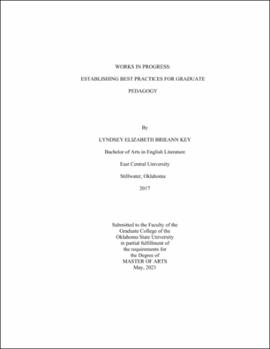| dc.contributor.advisor | Sicari, Anna | |
| dc.contributor.author | Key, Lyndsey Elizabeth Brieann | |
| dc.date.accessioned | 2021-09-23T19:51:51Z | |
| dc.date.available | 2021-09-23T19:51:51Z | |
| dc.date.issued | 2021-05 | |
| dc.identifier.uri | https://hdl.handle.net/11244/330865 | |
| dc.description.abstract | Education for graduate laborers in the United State has been based on an outdated model of pedagogical inheritance which compounds the inequalities making academic labor difficult and precarious. Currently, members of the MA and PhD programs spend up to a decade in training to teach the profitable undergraduate courses, but almost no curricula exists to prepare faculty (at any level) to teach a class of graduates. This study seeks to assess the values, habits, and beliefs of those working with GTAs to paint a picture of their work and learning conditions. Specifically, it aims to understand the efforts being made to fix these conditions, to identify the discrepancies in pedagogical strategies, and to call for the establishment of a set of best practices for graduate education. In this context, I argue for the substitution of "graduate student" for "graduate laborer" to highlight the work this group performs for the university as academics with plural roles, with only the abridged rights of either students or faculty. I also name the current framework for graduate education the "model-method of inherited pedagogy", call for the investigation of its practices, and challenge its standing as the ideal approach for preparing individuals to teach and advise the next generation of academics. | |
| dc.description.abstract | This study relied on Institutional Ethnography for its methodological framework. To test the hypothesis that perceptions of graduate labor impact the structure and quality of their education, virtual interviews were conducted with graduate students and faculty and then each participant was invited to partake in an anonymous survey. The findings showed that an absence of graduate pedagogical training is consistent across departments, programs, universities, and time spent in academia. These findings also indicate that teaching and mentorship practices rely almost exclusively on the model-method of inherited pedagogy, which can be linked to the troubling lack of advisement on alt-ac careers. I conclude with a call for a community-designed set of best practices for graduate pedagogy and suggest some graduate-specific teaching strategies, distilled from the experiences shared by the participants in my study. | |
| dc.format | application/pdf | |
| dc.language | en_US | |
| dc.rights | Copyright is held by the author who has granted the Oklahoma State University Library the non-exclusive right to share this material in its institutional repository. Contact Digital Library Services at lib-dls@okstate.edu or 405-744-9161 for the permission policy on the use, reproduction or distribution of this material. | |
| dc.title | Works in progress: Establishing best practices for graduate pedagogy | |
| dc.contributor.committeeMember | Lewis, Lynn | |
| dc.contributor.committeeMember | Daniel-Wariya, Joshua | |
| osu.filename | Key_okstate_0664M_17099.pdf | |
| osu.accesstype | Open Access | |
| dc.type.genre | Thesis | |
| dc.type.genre | Questionnaire | |
| dc.type.material | Text | |
| dc.subject.keywords | graduate labor | |
| dc.subject.keywords | graduate mentorship | |
| dc.subject.keywords | graduate teaching | |
| dc.subject.keywords | institutional ethnography | |
| dc.subject.keywords | model method of inherited pedagogy | |
| thesis.degree.discipline | English | |
| thesis.degree.grantor | Oklahoma State University | |

